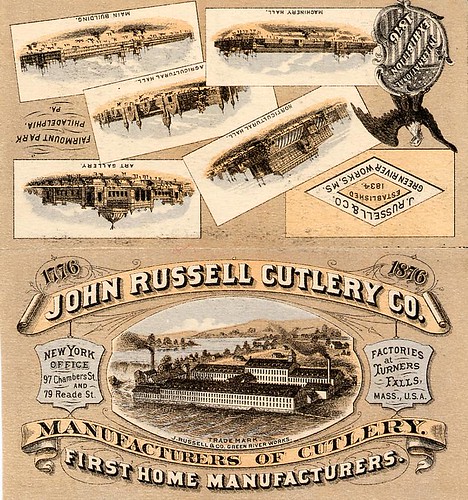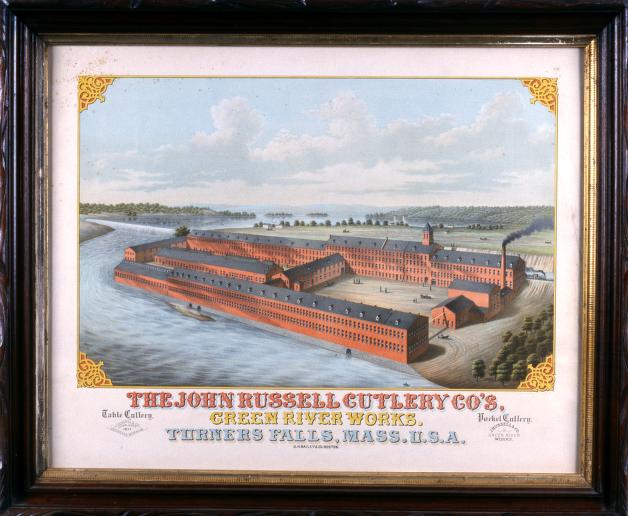iKnife Collector
The online community of knife collectors, A Knife Family Forged in Steel
The John Russell Cutlery Company
Reply by Sue OldsWidow on January 30, 2013 at 21:28
(c) Pocumtuck Valley Memorial Association, Deerfield MA. All rights reserved.
Industry : Transforming Rural Landscapes |
Early factories transformed the rural landscape. Less visible but no less dramatic were the ways in which they altered preexisting social and economic patterns. Factory owners preferred to locate their facilities in rural areas, where land was cheaper and more plentiful. Rivers and streams provided the waterpower upon which early factories depended to power their machinery.
Factories introduced a new element into the preexisting social order: the factory worker. Sometimes these men and women were members of the community that predated the factory. More often, however, workers arrived from elsewhere. This was especially true as factories began more and more to depend upon immigrant labor. Kinship networks stretching from Canada to New England, and from across the Atlantic to America, filled worker rolls. Regardless of their origin, these factory workers lived and interacted differently than did the farmers and tradesmen who predominated previously. Workers depended upon factory owners for their housing and their livelihoods. A time clock, shift hours and loyalty to a company supplanted the old agrarian culture and schedule. Whole communities were born, seemingly overnight, as factory-owned housing appeared alongside the factories themselves. Wealthy factory owners became prominent local figures who could and did challenge longstanding leaders and customs. The factory owner's ability to mobilize a large and dependent electorate of employees often troubled and angered other local elites.
Factories put even small towns on the map. They also created new communities where none existed previously. This pastoral image of the Connecticut River gave way to the industrial ambitions of a group of entrepreneurs who founded the Turners Falls Company in 1866. A bird's eye view of Turners Falls, Massachusetts, reveals that it was a planned industrial community from its founding in 1867. Note the way planners laid out the roads in a rigid, grid-like pattern. The John Russell Cutlery Company moved from Greenfield, Massachusetts, to Turners Falls in 1870. Note the proximity of the facility to the river. This print of the factory was intended to evoke pride in American industry. The black smoke billowing from the smokestack epitomized industrial progress. The artist carefully emphasized the factory's well-ordered, spacious layout and pristine condition. It also represented the factory as an attractive place for its 1200 employees to work and to live.
Tags: Cutlery, Factory, Russell
Replies to This Discussion
-
Permalink Reply by Jan Carter on July 4, 2014 at 16:00
-
This is a stereopticon photographic view of the John Russell Cutlery Company which was located in Turners Falls, Massachusetts. John Russell started his cutlery manufacturing business in Greenfield, Massachusetts, about 1834 at the "Green River Works" along the Green River. He moved his business in 1870 to the newly-planned industrial city, Turners Falls, Massachusetts. Alvah Crocker helped to found the Turners Falls Company who conceived of and a planned an industrial village to rival Lowell and Lawrence in eastern Massachusetts. When John Russell moved his cutlery manufactory to Turners Falls, he was the town's largest employer. Of the 1,166 people who worked in factories in Turners in 1880, 600 (51%) were employed by the Russell Cutlery. Cutlery, paper and cotton textiles formed the primary economic basis of the town. Russell employed a mix of native- and foreign-born workers. Men and women from Ireland, Germany, and Eastern European countries worked in the cutlery making over 150 kinds of pocket knives among other types of cutlery.
-
-
Permalink Reply by Jan Carter on July 12, 2014 at 13:40
-
Reply by Trent Rock on July 27, 2009
Honorable Mention to 1834===>
"Another New Englander, John Russell, founded his Green River Works on March 1, 1834. After having made his fortune in the cotton industry, Russell, at age 37, turned his energies to the manufacturing of quality cutlery. He built his water powered factory on the banks of the Green River near Greenfield Massachusetts. His first products, chisels and axe heads, were made from fine English steel of the type normally reserved for tableware. As the Green River works expanded its line to include knives, the company continued to use only the finest materials"
-
Latest Activity
Featureddead_left_knife_guy commented on dead_left_knife_guy's group The Kukri (Khukuri) Group
© 2026 Created by Jan Carter.
Powered by
![]()
